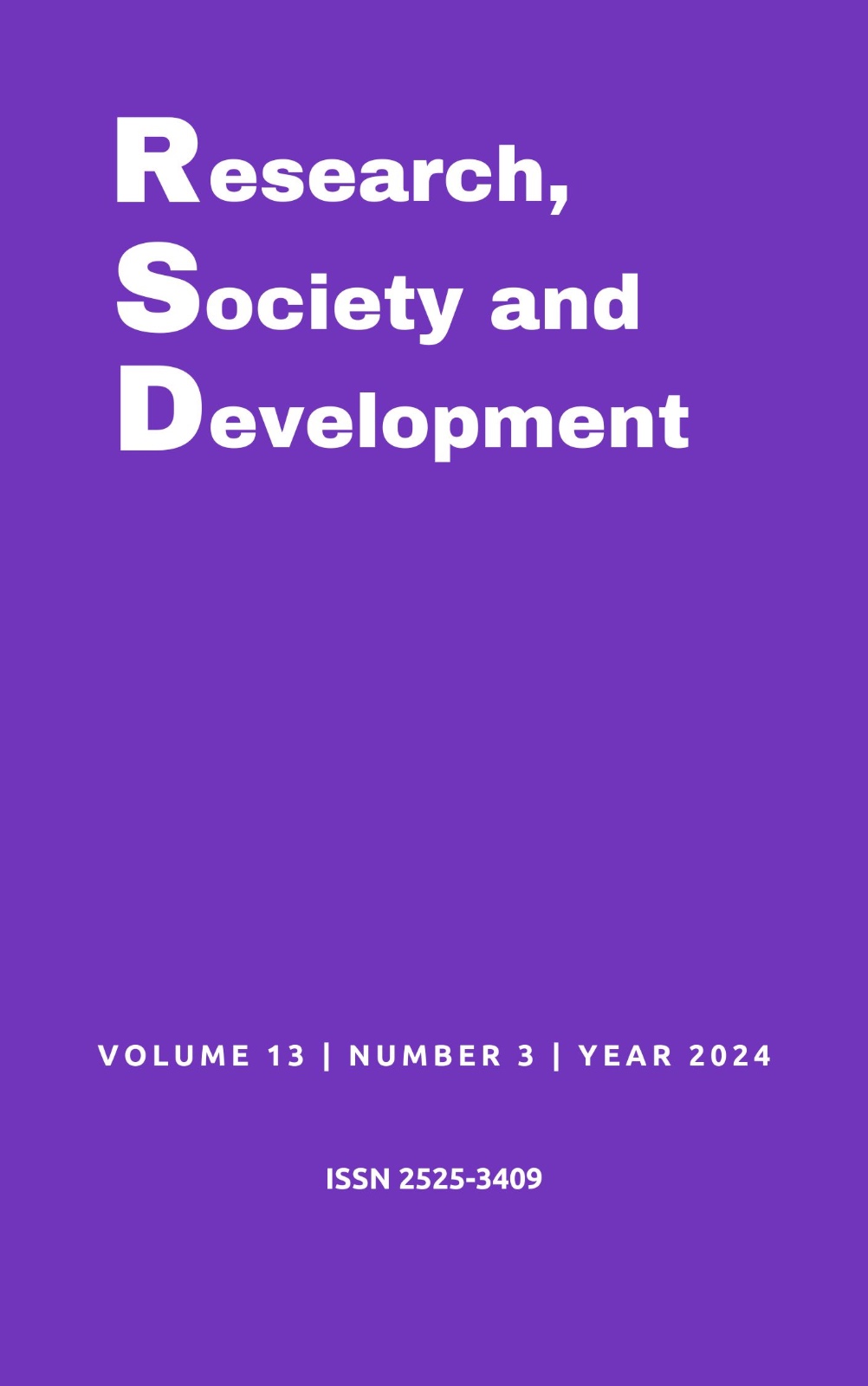Use of the rapid molecular test for the diagnosis of tuberculosis among homeless people: Scoping protocol
DOI:
https://doi.org/10.33448/rsd-v13i3.45394Keywords:
Molecular test; Tuberculosis; Homeless people.Abstract
This article presents the protocol for a scoping review, which aims to identify the impact of using the rapid molecular test for diagnosing tuberculosis among homeless people. The research question was formulated using the acronym PCC (population, concept and context): "What is the impact of using the rapid molecular test to diagnose tuberculosis among homeless people?". Controlled and free vocabularies will be used for the bibliographic survey in the following databases: EMBASE, Scopus, MEDLINE, Cinahl, Academic Search Premier, LILACS, Web of Science, Brazilian Digital Library of Theses and Dissertations, as well as Google Scholar. After the searches, the data will be exported to the Rayyan QCRI application, through which it will be possible to exclude duplicate publications and select the publications by having the titles and abstracts read by two independent reviewers. In a second selection stage, the eligible publications will be read in full. Before and after studies and time series studies will be included, as well as analytical observational studies, qualitative studies and opinion studies. The evidence presented will respond directly to the guiding question and the objective of the review and will be presented through a narrative synthesis, which, where appropriate, will be accompanied by tabulated results and/or graphs, which will map or describe the results found.
References
Arksey, H., & O'malley, L. (2005). Scoping studies: towards a methodological framework. International journal of social research methodology, 8(1), 19-32.
Alves, K. K. A. F., Borralho, L. M., Araújo, A. J. D., Bernardino, Í. D. M., & Figueiredo, T. M. R. M. D. (2020). Fatores associados à cura e ao abandono do tratamento da tuberculose na população privada de liberdade. Revista Brasileira de Epidemiologia, 23, e200079.
Levac, D., Colquhoun, H., & O'brien, K. K. (2010). Scoping studies: advancing the methodology. Implementation science, 5, 1-9.
Lima, T. M. D., Belotti, N. C. U., Nardi, S. M. T., & Pedro, H. D. S. P. (2017). GeneXpert MTB/RIF assay for diagnosis of tuberculosis/Teste rápido molecular GeneXpert MTB/RIF para diagnóstico da tuberculose. Rev Pan-Amaz Saude, 67-78.
Lyon, S. M., & Rossman, M. D. (2017). Pulmonary tuberculosis. Microbiology spectrum, 5(1), 10-1128.
Peters, M., Godfrey, C., McInerney, P., Munn, Z., Trico, A., & Khalil, H. (2020). Chapter 11: Scoping Reviews. In JBI Manual for Evidence Synthesis. Joanna Briggs Institute. https://doi.org/10.46658/JBIMES-20-12
Silva, T. O., Vianna, P. J. D. S., Almeida, M. V. G., Santos, S. D. D., & Nery, J. S. (2021). População em situação de rua no Brasil: estudo descritivo sobre o perfil sociodemográfico e da morbidade por tuberculose, 2014-2019. Epidemiologia e Serviços de Saúde, 30, e2020566.
Tibbetts, KK, Ottoson, RA e Tsukayama, DT (2020). Resposta de saúde pública ao surto de tuberculose entre pessoas em situação de rua, Minneapolis, Minnesota, EUA, 2017–2018. Doenças infecciosas emergentes, 26 (3), 420.
Tricco, A. C., Lillie, E., Zarin, W., O’brien, K., Colquhoun, H., Kastner, M., & Straus, S. E. (2016). A scoping review on the conduct and reporting of scoping reviews. BMC medical research methodology, 16, 1-10.
Tricco, AC, Lillie, E., Zarin, W., O'Brien, KK, Colquhoun, H., Levac, D., ... & Straus, SE (2018). Extensão PRISMA para revisões de escopo (PRISMA-ScR): lista de verificação e explicação. Anais de medicina interna, 169 (7), 467-473.
Tricco, A. C., Soobiah, C., Antony, J., Cogo, E., MacDonald, H., Lillie, E., ... & Kastner, M. (2016). A scoping review identifies multiple emerging knowledge synthesis methods, but few studies operationalize the method. Journal of Clinical Epidemiology, 73, 19-28.
Who. Global tuberculosis report 2022. Geneva: World Health Organization, 2022. https://www.who.int/teams/global-tuberculosis-programme/tb-reports/globaltuberculos s-report-2022 .
Ouzzani, M., Hammady, H., Fedorowicz, Z., & Elmagarmid, A. (2016). Rayyan – um aplicativo web e móvel para revisões sistemáticas. Revisões sistemáticas, 5 , 1-10.
Opota, O., Mazza-Stalder, J., Greub, G., & Jaton, K. (2019). The rapid molecular test Xpert MTB/RIF ultra: towards improved tuberculosis diagnosis and rifampicin resistance detection. Clinical Microbiology and Infection, 25(11), 1370-1376.
Page, M. J., McKenzie, J. E., Bossuyt, P. M., Boutron, I., Hoffmann, T. C., Mulrow, C. D., & Moher, D. (2021). The PRISMA 2020 statement: an updated guideline for reporting systematic reviews. Bmj, 372.
Peters, M., Godfrey, C., McInerney, P., Munn, Z., Trico, A., & Khalil, H. (2020). Chapter 11: Scoping Reviews. In JBI Manual for Evidence Synthesis. Joanna Briggs Institute. https://doi.org/10.46658/JBIMES-20-12
Pinto, P. F. P. S., Silveira, C., Rujula, M. J. P., Chiaravalloti Neto, F., & Ribeiro, M. C. S. D. A. (2017). Perfil epidemiológico da tuberculose no município de São Paulo de 2006 a 2013. Revista Brasileira de Epidemiologia, 20, 549-557.
World Health Organization. Health. (2010). Topics - Tuberculosis. http://www.who.int/topics/ tuberculosis/es/.
Downloads
Published
How to Cite
Issue
Section
License
Copyright (c) 2024 Kárita Gabriela Neves de Souza; Marcilene Fernanda Gomes Marinho; Giovana Martins Marinho; Jhennyfer de Souza Paula Dornelas Elias ; Jaqueline Pâmela Agazzi; Anna Paula Perim; Elisângela Franciscon Naves

This work is licensed under a Creative Commons Attribution 4.0 International License.
Authors who publish with this journal agree to the following terms:
1) Authors retain copyright and grant the journal right of first publication with the work simultaneously licensed under a Creative Commons Attribution License that allows others to share the work with an acknowledgement of the work's authorship and initial publication in this journal.
2) Authors are able to enter into separate, additional contractual arrangements for the non-exclusive distribution of the journal's published version of the work (e.g., post it to an institutional repository or publish it in a book), with an acknowledgement of its initial publication in this journal.
3) Authors are permitted and encouraged to post their work online (e.g., in institutional repositories or on their website) prior to and during the submission process, as it can lead to productive exchanges, as well as earlier and greater citation of published work.

